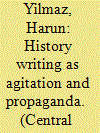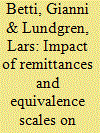|
|
|
Sort Order |
|
|
|
Items / Page
|
|
|
|
|
|
|
| Srl | Item |
| 1 |
ID:
116076


|
|
|
|
|
| Publication |
2012.
|
| Summary/Abstract |
The Afghanistani government's discriminatory policies against its ethno-religious minorities from the late nineteenth century to the end of World War II brought widespread resentment, which resulted in many local revolts. After the war, these took on a different dimension and led to the founding of an underground political party, Seri Itehad (Secret Unity). The party was different from the other political parties of the time because its goal was to foment an uprising to overthrow the monarchy and so establish a republic. This paper explores why and how the party emerged, and how the unique characteristics of the party's two co-founders, who had little in common in terms of socio-political and cultural backgrounds, shaped the aims, approach, organization, membership and operation of the party. It also examines the consequences of the uprising.
|
|
|
|
|
|
|
|
|
|
|
|
|
|
|
|
| 2 |
ID:
116072


|
|
|
|
|
| Publication |
2012.
|
| Summary/Abstract |
This article addresses temporary labour migration - known in Russian as otkhodnichestvo (going away on foot) - from the Russian republic of Dagestan. The discussion is situated within reviews of current work on migration in the former Soviet Union, push-pull factors determining migration behaviour in the North Caucasus, and the historical importance of otkhodnichestvo in imperial Russia and the USSR. The paper then turns to the results of a census conducted in summer 2006, which found that most migrants come from Dagestan's mountainous southwest, frequently obtain work at locations characterized by economic growth and high pay, and rely on ethnic or communal networks as a basis for choosing employment sector and destination when searching for work.
|
|
|
|
|
|
|
|
|
|
|
|
|
|
|
|
| 3 |
ID:
116074


|
|
|
|
|
| Publication |
2012.
|
| Summary/Abstract |
The reconstruction of the Soviet recent past is a controversial issue in the post-Soviet republics. In Kazakhstan, the reconstruction of the past has gradually rehabilitated leading Kazakh communists, such as Zhumabai Shaiakhmetov. One of the main rationales of this rehabilitation is his support for Kazakh historical writing, which resulted in a textbook published in 1943. This work has been seen as an endeavor by 'patriotic' Kazakh officials and historians to defend Kazakh national heritage against the 'Soviet colonial empire'. By presenting a broader view of the war period in Kazakhstan from the archives, this article argues that this history textbook was in fact merely an agitation-propaganda product of the Communist Party of Kazakhstan. Shaiakhmetov and others had mostly secured their career by remaining loyal to the Soviet system during the collectivization, the Great Famine and the Great Terror. Therefore, their encouragement of the publication of a national history in 1943 for propaganda purposes does not qualify them as suitable predecessors of the current generation of Kazakh rulers.
|
|
|
|
|
|
|
|
|
|
|
|
|
|
|
|
| 4 |
ID:
116073


|
|
|
|
|
| Publication |
2012.
|
| Summary/Abstract |
The aim of this paper is to study the impact of remittances from labour migrants on welfare, as well as the impact of the use of equivalence scales on poverty, in Tajikistan. The magnitude of remittances sent back is fairly well known from official statistics (e.g. the amount of remittances is regularly monitored by the balance of payment at the Central Bank). In 2009 a change in the flow of money from abroad occurred, and volumes dropped, but it was unknown to what extent; its impact on poverty is still officially unknown. This paper describes a project aimed at conducting a survey to investigate this impact. It would not be possible to do this kind of analysis with a traditional sample survey, since it would generate only a small selection of migrant households. Instead, the new Migration, Remittances and Poverty Survey was used, which was conducted by the Tajik State Statistical Office in August 2010 using an adaptive sampling design from a set of enumeration areas selected mainly from the 2009 Integrated Household Budget Survey (IHBS) and showing households with remittances. To evaluate the impact of equivalence scales on poverty measures, new scales have been estimated on the basis of consumption expenditure from the 2009 IHBS.
|
|
|
|
|
|
|
|
|
|
|
|
|
|
|
|
| 5 |
ID:
116075


|
|
|
|
|
| Publication |
2012.
|
| Summary/Abstract |
This paper examines persistence and change in the Soviet Union's and then Russia's relations with Afghanistan with respect to development and security. First, a detailed analysis of the promise and reality of Soviet development assistance reveals conceptual shortcomings in their attempt to induce economic development in Afghanistan. The Soviet Union's heritage is then revealed in order to understand Russia's current perception of post-Taliban Afghanistan as well as Russia's emerging interests and commitment to Afghanistan's economic development. This paper argues that Russia will most likely replicate standard industrialization development approaches in contributing to Afghanistan's development. Therefore, Russia will probably run into problems similar to those that led to the failure of the Soviet modernization project, which consisted of large-scale development projects that were inappropriate to the country's institutions and the lives of most Afghans. It is questionable whether such reiteration will induce economic development now, in the complex setting of a fragmented and fragile state with a multitude of external players looking out for their own interests.
|
|
|
|
|
|
|
|
|
|
|
|
|
|
|
|
|
|
|
|
|